
A common question our personal injury lawyers are asked is how long our clients’ lawsuits will take. Our clients often ask this question because they are amassing a lot of medical bills, they can’t work because of their injuries, and they need money because of it.
Unfortunately, there is no one-size-fits-all answer to this question. How long your case will take to settle depends on the individual circumstances of your lawsuit; no two lawsuits are the same.
Most personal injury cases resolve within one to three years.
A tort is a civil wrong which harms someone or causes someone to suffer loss. Personal injury cases are known as tort cases. Tort trials, on average, reach a verdict 25.6 months from the lawsuit filing date, and only about 3 percent of tort cases end up resolving in a jury or bench trial verdict, according to United States Department of Justice data. This means that about 97% of tort cases are resolved before trial.
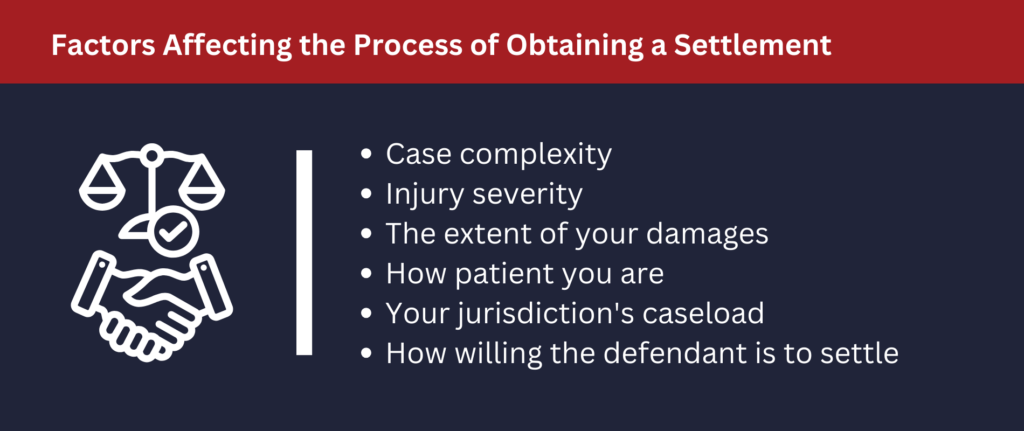
Many factors can impact how long the process of obtaining a settlement or jury verdict in a personal injury case will take. These factors include:
- How complex the case is. Medical malpractice cases are more complex than car accident cases, which are in turn more complex than slip and fall cases.
- How severe your injuries are. The most severe injuries seen in personal injury cases are brain damage and death, and cases involving these injuries may take longer than cases involving even head or neck injuries. While they may not take as long as a case involving head or neck injuries, cases involving broken bones may take longer than cases involving a simple sprained ankle.
- How much damages there are. Cases involving over $1 million in damages may take longer than cases involving $100,000 in damages, which may in turn take longer than cases involving $1,000 in damages.
- How patient you are. If you are anxious to settle your case, you may accept a settlement offer quickly. Your case might take longer if you’re willing to wait for a larger settlement offer, or for your case to go to trial.
- Your jurisdiction’s case load. The court dates available (and not available) in your jurisdiction can impact how long your case takes.
- How willing the defendant is to settle. How willing the defendant is to settle, and how much they want to avoid a lawsuit, can impact the length of your case.
Confusing, complicated evidence can lead to cases taking longer to settle, as can having multiple defendants, or having injury victims who suffer severe injuries which require a lot of medical treatment. Cases can settle more quickly when mild injuries, simple facts and quickly-responding insurers are involved.
So When Should you hire a personal injury lawyer? The involvement of a personal injury lawyer can produce a quicker settlement time, whereas the absence of a personal injury lawyer can lead to a longer settlement time. So to speed up the settlement time on your claim consider learning more about your specific case type by reviewing some of our practice areas and scheduling an appointment to speak with an seasoned attorney right away.
What Is The Personal Injury Lawsuit Process?
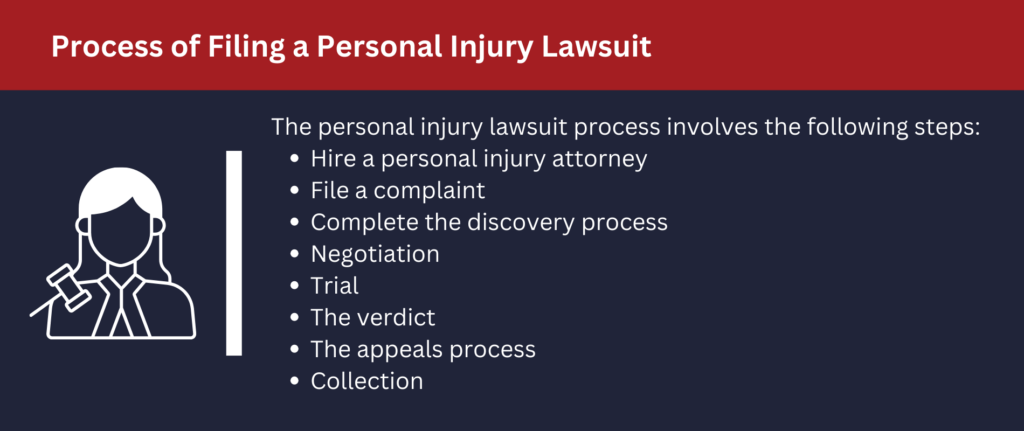
Understanding the timeframe of your personal injury claim you need to understand the legal process of filing a personal injury lawsuit. There are many steps to the process of filing a personal injury lawsuit and obtaining a settlement or trial verdict below we have listed out 8 key parts:
First Step: Hire A Personal Injury Attorney
You should hire experienced personal injury lawyers like us if you’ve suffered anything more than very minor injuries and the injuries were someone else’s fault. The reason why is because those who hire personal injury attorneys, on average, receive much more money for their injuries than those who do not.
Most personal injury lawyers, like those at Nadrich Accident Injury Lawyers, offer free consultations and are contingency fee attorneys. This means that they do not charge a fee to represent you unless and until they obtain a financial recovery for you. In other words, you will never owe them any money out of your own pocket and you will never be charged an upfront fee.
Contingency fee lawyers do charge a percentage of any financial recovery obtained for their clients. However, even after this fee is deducted from your settlement, you will still probably obtain far more money for your injuries with a lawyer than without a lawyer, and a lawyer won’t cost you any money out of your own pocket, so there is no good reason not to hire a personal injury lawyer if you’ve suffered a serious injury that wasn’t your fault.
The reason why those who hire personal injury lawyers typically receive more money for their injuries than those who don’t is because the source of financial compensation in a personal injury case is typically an insurance company, and insurance companies simply don’t respect injury claimants who aren’t represented by a lawyer.
Insurance companies are more concerned with protecting their own profit margin than they are with your ability to pay your medical bills. They also have expensive corporate lawyers at their side, ready to defend them against anyone trying to sue those they insure in court. They know you can’t beat their lawyers in court if you don’t have a lawyer of your own. Thus, if you don’t have a lawyer representing you, they will never offer you the fair settlement offer that you deserve. They will only offer you a small portion of what you deserve, leaving you with the choice of accepting it or taking them to court without a lawyer, where they know you will lose.
In addition, insurance adjusters are experts at finding ways to not pay claimants. They are trained to manipulate claimants into saying things that imply that they’re at fault for their own injuries, or that their injuries aren’t as severe as they’re claiming. They use these accidental slip-ups by claimants to justify not paying claimants what they deserve for their injuries. They are also experts at delay tactics. They often try to delay claims past the time limit claimants have to file a lawsuit. Once this time limit expires, a claimant has no leverage in terms of convincing an insurance company to offer them a fair settlement.
Being represented by strong, battle-tested personal injury lawyers like the ones at Nadrich Accident Injury Lawyers sends a message to insurance companies: you can and will likely beat them in court, and they will not be able to successfully use delay tactics or trick you into incriminating yourself, because knowledgeable lawyers will be handling the claims process and all communications for you.
Insurance companies keep files on personal injury lawyers. Almost all of our cases settle out of court because the insurance companies’ files on us show that we have a long track record of success and are likely to beat them in court. The insurance companies know it’s a waste of legal fees to take us on in court, so they almost always settle with our clients out of court for a fair amount. For more information regarding choosing the right personal injury lawyer reviews, practice areas, and previous settlements can indicate the quality of the firm handling your claim.
Second Step: File A Complaint
Filing a complaint officially begins the civil lawsuit process. This involves filing a complaint in the right court, paying the filing fee and serving the defendant with a summons and a copy of the complaint.
Complaints contain the details of your case, an argument for how the defendant is liable for your injuries, and the amount of money you demand. A summons is a document which tells the defendant that a lawsuit is being filed against them.
Once a lawyer agrees to represent you, they will determine what the statute of limitations is regarding your case. A statute of limitations is a time limit you have to file a lawsuit. The statute of limitations for personal injury cases in California is generally two years from the date of the injury.
Your lawyer still start to draft a complaint keeping this time limit in mind. It usually takes between a week and a year for a complaint to be drafted and a defendant to be served.
Several factors can impact how long the complaint drafting and defendant serving process can take, including:
- If your lawyer decides to negotiate before the complaint is filed
- How complex your case is and how many defendants there are
- If your lawyer has problems serving defendants, such as trouble finding defendants
Defendants will usually be served within 30 to 60 days from the date a complaint is filed, and they will usually have 30 to 45 days to file their response. Thus, it usually takes about three months from the date your complaint is filed until an initial response from an insurer is received.
Court motions can occur at any point during the lawsuit process once a complaint is filed. These pre-trial motions can be filed by your lawyer or the defendant’s lawyer, and will ask the court to rule on issues such as jurisdiction, discoverable documents, default, improper process, venue, etc.
Some motions can add more time to the lawsuit process than others. A motion for summary judgment, a motion which requests that a case be dismissed, may take longer than many other motions, such as motions to compel the turning over of evidence.
Third Step: The Process Of Discovery
The discovery process is the process where the two sides in a lawsuit exchange information, including:
- Medical records
- Police reports
- Company emails
- Security footage
Facts are dug up, documents are gathered and produced, depositions are taken and witness statements are taken during the discovery process. Depositions are when both sides ask each other, and witnesses, questions, under oath. Depositions are held in front of a court reporter who creates a transcript of the deposition for each side. Depositions typically take around three months to complete.
Disputes about the event that caused your injury are investigated during discovery. The discovery process may include accident reconstruction.
Defendants may require you to receive a medical examination by a doctor that they choose. This doctor is working for the defendant and might try to discredit your injuries or their cause. Your personal injury lawyer will be present for this exam and will prepare you for it.
The discovery process typically involves waiting for an injured claimant to reach Maximum Medical Improvement (MMI), the state at which a healthcare provider determines your injuries will not improve with further treatment, or a firm prognosis from a healthcare provider. The next step in the lawsuit process, negotiation, usually can’t take place until MMI or a firm prognosis is reached.
Once MMI or a firm prognosis is reached, your lawyer will submit a demand letter to the defendant’s insurance company. This letter details and valuates all of the financial losses you have suffered due to your injuries, and demands payment for the total financial loss you have suffered.
Insurers may respond quickly to a demand letter, or they may not respond to it for months.
Fourth Step: Negotiation
The negotiation step is the step where the two sides attempt to settle the case out of court. Most personal injury cases end during this step. Personal injury lawyers usually begin settlement discussions shortly after the start of the discovery process.
You may reach a settlement with the defendant at any point during the negotiation process, at which point your case is over. Your lawyer may not tell you about every detail of every settlement discussion they have with the defendant’s insurance company. However, your lawyer must gain your approval before agreeing to or rejecting any settlement offer from the defendant’s insurance company.
The negotiation process can involve simple interactions like two lawyers talking over the phone. It can also involve mediation or arbitration.
What is Mediation?
Mediation involves having an unbiased third party help the two sides reach a settlement. The two sides get together with the mediator and talk about their own sides of the case, as well as speak privately with the mediator. The mediator then uses the information they’ve learned to convince the two sides to compromise and reach a settlement for an amount the mediator thinks is fair.
Sometimes courts make using a mediator mandatory. Sometimes lawyers decide to seek mediators’ help. Settlements do not have to be agreed on when mediators get involved, though, as legally binding contracts can’t be made by mediators.
Mediation is usually faster than going to court when it comes to a personal injury case. The mediation process usually starts between 9 and 18 months after your injuries, and the process itself usually takes one or two days.
What is Arbitration?
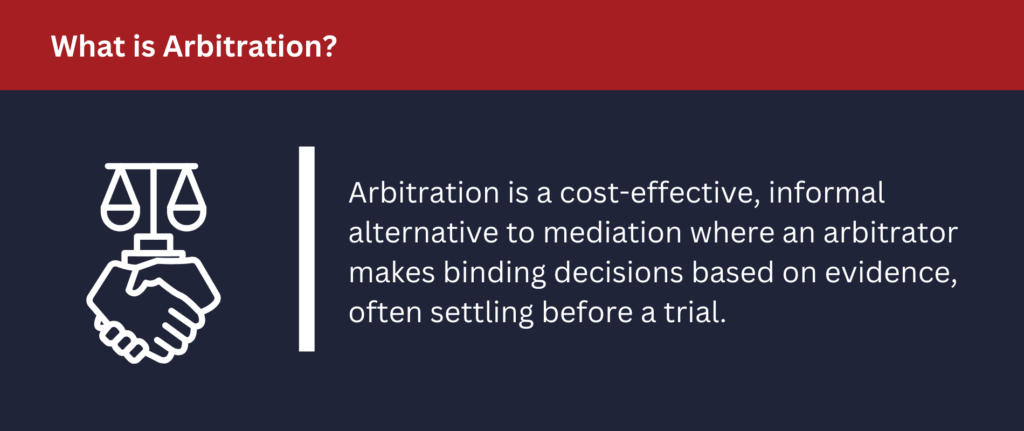
Arbitration is similar to mediation, except the decision made by an arbitrator or panel of arbitrators is typically binding.
Arbitrators review evidence that both sides present and decide how they think compensation should occur.
Arbitrators aren’t as restricted as judges regarding viewing evidence and making decisions, so arbitration is less formal and less expensive than taking a trial to court, but usually more formal than mediation.
Arbitration can be voluntary or mandatory.
Arbitrators listen to each side’s arguments, just like mediators. These arguments can involve evidence and witnesses.
Arbitrators’ decisions can be binding or nonbinding. They will come to a decision on how they think compensation should be awarded. If this decision is binding, both sides must abide by it, just as they would with a judge’s decision.
Arbitrators’ decisions can be repealed, but this is uncommon.
You can reject a nonbinding decision by an arbitrator and look to settle via another negotiation means.
Most personal injury cases do not settle right away. In fact, many cases settle right before a trial. Most cases settle before going to trial.
Injury victims and insurance adjusters usually agree on a settlement offer after a few months of negotiations, but it can take over a year to agree on a settlement when complex facts and serious injuries are involved.
Fifth Step: Trial
Your personal injury case will go to trial if it fails to settle. A settlement can occur at any point during the trial process.
During the trial process, a jury or judge will examine evidence and decide whether a defendant is financially liable for your injuries.
Personal injury trials usually consist of the following phases:
- Choosing the jury
- Opening statements are made
- Witnesses testify and are cross-examined
- Closing arguments are made
- The jury is instructed
- The jury deliberates and comes to a verdict
Personal injury trials usually last from one to seven days.
Sixth Step: The Verdict
A verdict typically occurs one to two years after a lawsuit is filed. A judge or jury will determine whether a defendant is liable for your injuries, and how much they must pay you if they are.
Seventh Step: The Appeals Process
Either side in the lawsuit can appeal a verdict they disagree with. A successful appeal can lead to a new settlement amount or a new trial.
Eighth Step: Collection
Collection of a judgment, or efforts to collect a judgment, begin when a plaintiff’s lawsuit is successful. Judgments can be lump sums or divided into multiple payments.
Why Is My Personal Injury Case Taking So Long?
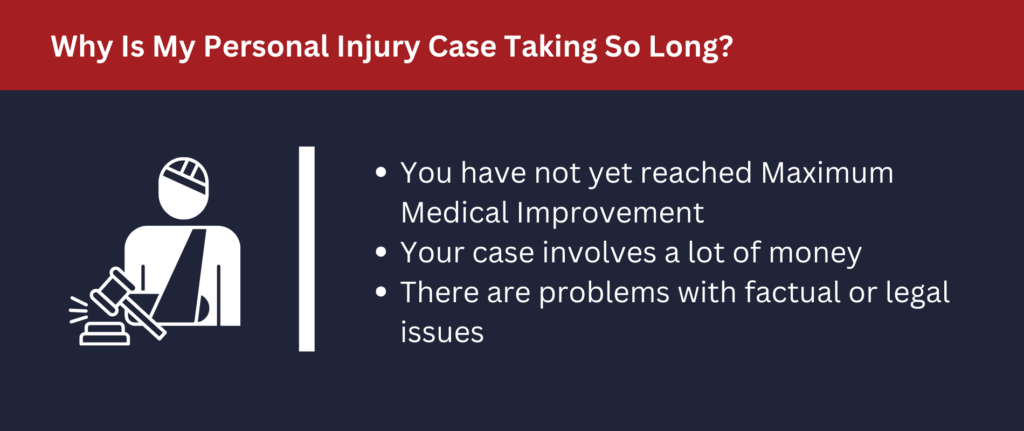
The three most common reasons personal injury cases take a long time to settle are:
- You have not yet reached MMI
- Your case involves a lot of money
- There are problems with factual or legal issues
Your case is going to take a significant amount of time to settle in these circumstances, unless you’re willing to accept a much smaller settlement offer than you deserve.
You Have Not Yet Reached MMI
Your lawyer will simply not be able to properly value your case if you haven’t reached MMI yet, as the full extent and nature of your injuries, and how they impact your life, will not be clear. For this reason, you should never accept a settlement offer until you’ve reached MMI or at least a firm prognosis from a doctor.
Your Case Involves A Lot Of Money
Insurers will not be willing to pay out a huge settlement unless they have thoroughly investigated every aspect of your case. They will not pay out a huge settlement before exercising due diligence and convincing themselves that they can’t defend against your claim, your injuries are as bad as you claim, and they can’t attack your credibility.
Insurers will often delay big cases as long as they can just to try to get a plaintiff to give up and accept a smaller settlement.
There Are Problems With Factual Or Legal Issues
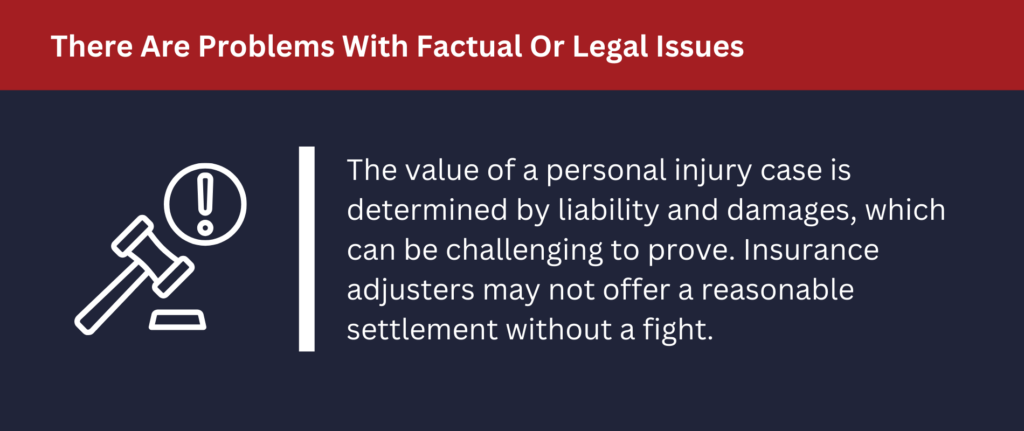
Personal injury cases’ value are driven by liability and damages. Liability means who is at fault for the injuries, and damages means how badly the injured party was hurt.
Liability can be hard to prove. Sometimes witnesses and both sides will all say different things, for example. When liability is hard to prove, insurance adjusters probably won’t make a reasonable settlement offer until a plaintiff shows they’re willing to fight for it by hiring a lawyer, filing a lawsuit, and hiring liability experts who can prove a defendant is at fault. If an insurance adjuster doesn’t believe you have a legal right to sue, they probably won’t make a reasonable settlement offer until a judge rules you have the right to sue.
Issues can arise regarding damages as well. Doctors who treat you might be unsure that your injuries were caused by the negligence of a defendant. An insurance adjuster probably won’t make a reasonable settlement offer until they know your lawyer can get a doctor to testify that the defendant’s negligence caused you to be injured.
The Bottom Line: Every Case Is Different
As you can see, the personal injury lawsuit process is complex and there are many factors that can impact how long your case will take. Every case will take a different amount of time to settle based on the individual circumstances of the case.
If you’ve been injured, it’s someone else’s fault you were injured, and you’re wondering how long it might take you to receive fair compensation for your injuries, Contact us today at 800-718-4658 for a free consultation. We can answer any questions you may have, such as how long your case might take or how much your case might be worth.
{ “@context”: “https://schema.org”, “@type”: “FAQPage”, “mainEntity”: [ { “@type”: “Question”, “name”: “Why Is My Personal Injury Case Taking So Long?”, “acceptedAnswer”: { “@type”: “Answer”, “text”: “
The three most common reasons personal injury cases take a long time to settle are:
n- n
- You have not yet reached MMI n
- Your case involves a lot of money n
- There are problems with factual or legal issues n
Your case is going to take a significant amount of time to settle in these circumstances, unless you’re willing to accept a much smaller settlement offer than you deserve.
” } }, { “@type”: “Question”, “name”: “How Long Does It Take For a Personal Injury Case to Settle”, “acceptedAnswer”: { “@type”: “Answer”, “text”: “A common question our personal injury lawyers are asked is how long our clients’ lawsuits will take. Our clients often ask this question because they are amassing a lot of medical bills, they can’t work because of their injuries, and they need money because of it.
nUnfortunately, there is no one-size-fits-all answer to this question. How long your case will take to settle depends on the individual circumstances of your lawsuit; no two lawsuits are the same.
nMost personal injury cases resolve within one to three years.” } }, { “@type”: “Question”, “name”: “What Is The Personal Injury Lawsuit Process?”, “acceptedAnswer”: { “@type”: “Answer”, “text”: “There are many steps to the process of filing a personal injury lawsuit and obtaining a settlement or trial verdict below we have listed out 8 key parts:….” } }, { “@type”: “Question”, “name”: “What is Mediation? “, “acceptedAnswer”: { “@type”: “Answer”, “text”: “Mediation involves having an unbiased third party help the two sides reach a settlement. The two sides get together with the mediator and talk about their own sides of the case, as well as speak privately with the mediator. The mediator then uses the information they’ve learned to convince the two sides to compromise and reach a settlement for an amount the mediator thinks is fair.” } }, { “@type”: “Question”, “name”: “What is Arbitration? “, “acceptedAnswer”: { “@type”: “Answer”, “text”: “Arbitration is similar to mediation, except the decision made by an arbitrator or panel of arbitrators is typically binding.” } } ] }
